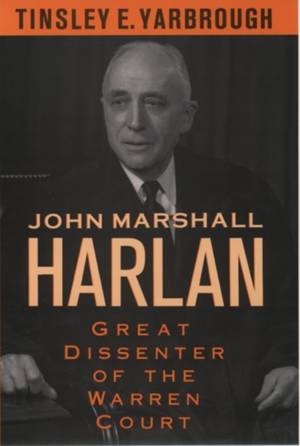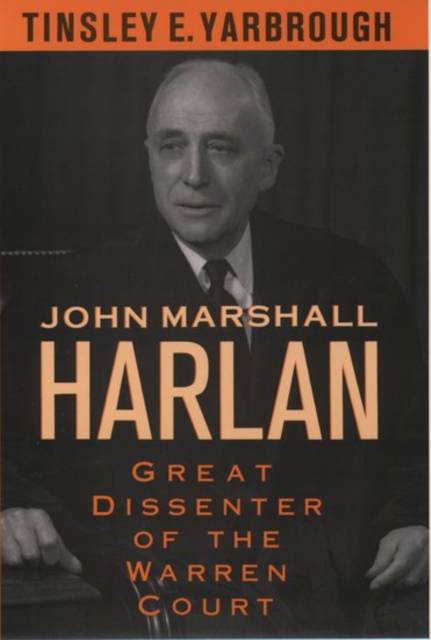
- Retrait gratuit dans votre magasin Club
- 7.000.000 titres dans notre catalogue
- Payer en toute sécurité
- Toujours un magasin près de chez vous
- Retrait gratuit dans votre magasin Club
- 7.000.000 titres dans notre catalogue
- Payer en toute sécurité
- Toujours un magasin près de chez vous
106,45 €
+ 212 points
Description
When David Souter was nominated by President Bush to the Supreme Court, he cited John Marshall Harlan as his model. It was an interesting choice. Admired by conservatives and deeply respected by his liberal brethren, Harlan was a man, as Justice William Brennan lamented, whose "massive scholarship" has never been fully recognized. In addition, he was the second Harlan to sit on the Court, following his grandfather--also named John Marshall Harlan. But while his grandfather was an outspoken supporter of reconstruction on a conservative court, the younger Harlan emerged as a critic of the Warren Court's liberal expansion of civil liberties.
Now, in the first biography of this important but neglected jurist, Tinsley Yarbrough provides a detailed account of Harlan's life, from his privileged childhood to his retirement and death. Yarbrough examines the forces and events which shaped the Justice's jurisprudence--his early life and often complex family relationships, education at Princeton and Oxford, his work as a prosecutor during Prohibition, Republican Party activities, wartime service in the Army Air Force, and years as one of the nation's preeminent corporate lawyers (a career culminating in his defense of the du Pont brothers in the massive DuPont-GM antitrust suit). The book focuses, however, on Harlan's years on the high bench. Yarbrough weaves together discussions of the Justice's relations with his brethren, clerks, and staff, an examination of Harlan's role in the decision-making process on the Court, and an analysis of his jurisprudence. The Justice's approach to constitutional interpretation exalted precedent, deference to governmental power, and narrow decisions closely tied to case facts; but he also accepted an evolving, creative model of constitutional construction which permitted expansive readings of constitutional rights. Yarbrough's details Harlan's close relationship with Justice Frankfurter, showing how--despite their friendship and alliance--Harlan strongly marked out his own position, both personally and judicially, on the Warren and Burger courts. And he examines the substance and significance of his dissents in such famous cases as Miranda and the Pentagon Papers.
Intensively researched, smoothly written, and incisively argued, Yarbrough's biography offers an absorbing account of the life and career of a great dissenter, hailed by admirers as a "lawyer's lawyer" and a "judge's judge." Coming at a time when the high court has begun to adopt many of Harlan's principles, this account provides an essential perspective on the Court, civil liberties, and a pivotal figure in the history of both.
Now, in the first biography of this important but neglected jurist, Tinsley Yarbrough provides a detailed account of Harlan's life, from his privileged childhood to his retirement and death. Yarbrough examines the forces and events which shaped the Justice's jurisprudence--his early life and often complex family relationships, education at Princeton and Oxford, his work as a prosecutor during Prohibition, Republican Party activities, wartime service in the Army Air Force, and years as one of the nation's preeminent corporate lawyers (a career culminating in his defense of the du Pont brothers in the massive DuPont-GM antitrust suit). The book focuses, however, on Harlan's years on the high bench. Yarbrough weaves together discussions of the Justice's relations with his brethren, clerks, and staff, an examination of Harlan's role in the decision-making process on the Court, and an analysis of his jurisprudence. The Justice's approach to constitutional interpretation exalted precedent, deference to governmental power, and narrow decisions closely tied to case facts; but he also accepted an evolving, creative model of constitutional construction which permitted expansive readings of constitutional rights. Yarbrough's details Harlan's close relationship with Justice Frankfurter, showing how--despite their friendship and alliance--Harlan strongly marked out his own position, both personally and judicially, on the Warren and Burger courts. And he examines the substance and significance of his dissents in such famous cases as Miranda and the Pentagon Papers.
Intensively researched, smoothly written, and incisively argued, Yarbrough's biography offers an absorbing account of the life and career of a great dissenter, hailed by admirers as a "lawyer's lawyer" and a "judge's judge." Coming at a time when the high court has begun to adopt many of Harlan's principles, this account provides an essential perspective on the Court, civil liberties, and a pivotal figure in the history of both.
Spécifications
Parties prenantes
- Auteur(s) :
- Editeur:
Contenu
- Nombre de pages :
- 432
- Langue:
- Anglais
Caractéristiques
- EAN:
- 9780195060904
- Date de parution :
- 12-03-92
- Format:
- Livre relié
- Format numérique:
- Genaaid
- Dimensions :
- 158 mm x 238 mm
- Poids :
- 766 g







